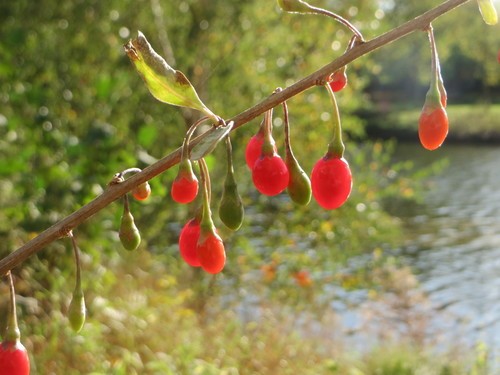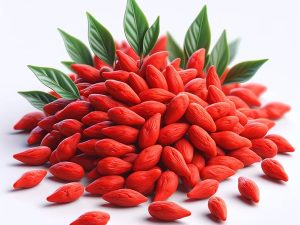Key Takeaways

“Goji berries | The super berries from China! Sooo healthy! | Like_the_Grand_Canyon | Flickr” from flickr.com and used with no modifications.
- Understanding a rabbit’s dietary needs is crucial for their health.
- Goji berries have a rich nutritional profile but must be given in moderation.
- Some foods are toxic to rabbits and should always be avoided.
- Introducing new foods to a rabbit’s diet should be done cautiously.
- Knowing when to consult a vet can prevent health issues related to diet.
Rabbit Dietary Fundamentals: Safeguarding Your Hoppy Friend’s Health
![]()
“Goji Berries Images | Free Photos, PNG Stickers, Wallpapers & Backgrounds – rawpixel” from rawpixel.com and used with no modifications.
When it comes to feeding your fluffy companion, getting it right is essential. Rabbits have delicate digestive systems, and what they eat can significantly affect their well-being. So, let’s hop right in and uncover the basics of a rabbit-safe diet.
Understanding Rabbit Nutrition
First things first,
- Fresh hay should make up about 80% of their diet.
- Leafy greens are next on the menu, with a variety of at least three types daily.
- Pellets are like a vitamin boost, so just a handful will do.
Now, let’s talk about treats. While we love to spoil our pets, moderation is key. Treats should be given sparingly and must be safe for your rabbit to nibble on.
Identifying Toxic Foods for Rabbits
It’s not just about what to feed your rabbit, but also what to avoid. Some foods can be harmful, or even deadly, to rabbits. For instance, never give your rabbit chocolate, avocado, or rhubarb. These are no-nos because they contain substances that can cause serious health issues for your bunny.
Goji Berries Uncovered: Nutritional Profile and Benefits
![]()
“Goji Berries Images | Free Photos, PNG Stickers, Wallpapers & Backgrounds – rawpixel” from rawpixel.com and used with no modifications.
Now, onto the heart of the matter—goji berries. They’re touted as a superfood for humans, but can rabbits enjoy them too? Goji berries are indeed packed with nutrients, but that doesn’t automatically make them a safe snack for your rabbit.
- They’re rich in antioxidants, which are great for overall health.
- Goji berries also contain vitamins A and C, both beneficial for immune function.
- They have fiber, which can be good for your rabbit’s digestion.
But here’s the catch—goji berries are also high in sugar. Rabbits have a sweet tooth, but too much sugar can lead to obesity and other health issues. Therefore, if you’re considering goji berries as a treat, they must be given in moderation.
What Goes Into a Goji Berry: Vitamins and Minerals
Goji berries come from the Lycium plant and are a powerhouse of nutrition. They’re not just tasty; they’re filled with vitamins and minerals that can support a healthy immune system. Here’s a quick rundown of what these little berries contain:
- Vitamin A: Essential for vision and immune function.
- Vitamin C: Important for skin health and immune support.
- Iron: Crucial for blood health and energy levels.
With such a nutritional punch, it’s tempting to make goji berries a regular part of your rabbit’s diet. But, because of their sugar content, they should be more of an occasional delight rather than a staple.
Goji Berries in Traditional Medicine and Modern Health Claims
Goji berries aren’t just a modern-day health craze; they’ve been used in traditional Chinese medicine for centuries. They’re believed to support kidney and liver function, improve eyesight, and promote longevity. While these claims might be a bit overstated, there’s no denying that goji berries have some health benefits.
However, when it comes to your rabbit, the rules are a bit different. Their health and dietary needs don’t always align with ours, so it’s important to adapt accordingly.
Feeding Goji Berries to Rabbits: A Safe Treat?

“Chinese wolfberry (Lycium barbarum) Flower, Leaf, Care, Uses – PictureThis” from picturethisai.com and used with no modifications.
So, you’ve got a stash of goji berries and you’re tempted to share with your bunny. Hold on just a second. While these berries are not toxic to rabbits, the key is to feed them in the right amount. Think of goji berries as the occasional indulgence for your rabbit, much like a piece of fine chocolate for us humans.
Evaluating Goji Berry Safety for Rabbits
Before introducing any new
- The size of your rabbit: Smaller breeds should have fewer treats.
- Their overall diet: Ensure they’re getting plenty of hay and greens first.
- Any health issues: Consult your vet if your rabbit has a history of digestive troubles.
Most importantly, start with a tiny amount to see how your rabbit reacts. If there are no adverse effects, like diarrhea or changes in appetite, you can offer goji berries as an occasional treat.
Recommended Quantities and Frequency of Feeding
Now, for the specifics. How much and how often can you treat your rabbit to goji berries? Think of them as a special treat, not a daily supplement. A couple of dried goji berries once or twice a week is plenty for most rabbits. Always monitor your rabbit’s reaction and consult with your vet if you’re unsure.
To Feed or Not to Feed: Identifying Signs of Rabbit Food Intolerances
![]()
“Goji Berries Images | Free Photos, PNG Stickers, Wallpapers & Backgrounds – rawpixel” from rawpixel.com and used with no modifications.
Just like us, rabbits can have food sensitivities or intolerances. Introducing new foods, including goji berries, should be done with caution. Pay close attention to how your rabbit responds after eating a new treat.
- Watch for signs of digestive upset, such as diarrhea or constipation.
- Changes in behavior or appetite could also indicate a problem.
- If you notice any negative reactions, remove the new food immediately and consult a vet.
Besides that, always ensure your rabbit has access to fresh
Spotting Adverse Reactions in Rabbits After New Foods
When you give your rabbit a new treat like goji berries, observe them closely. An adverse reaction might not be immediate, so keep an eye on them for at least 24 hours. If you notice any of the following, it’s time to stop the new treat and seek advice:
- Lethargy or lack of interest in their usual activities.
- Any changes in their droppings—size, frequency, or consistency.
- Signs of discomfort, such as hunching or grinding their teeth.
Remember, it’s always better to err on the side of caution when it comes to your rabbit’s diet. When in doubt, leave it out.
When to Consult a Vet: Dietary Changes and Rabbit Health
If you’re ever unsure about feeding your rabbit something new, or if they show any signs of distress after eating, it’s time to call the vet. They can provide guidance and ensure that your rabbit’s diet is both safe and nutritious.
- Always consult your vet before making significant changes to your rabbit’s diet.
- If your rabbit has pre-existing health conditions, a vet’s advice is even more crucial.
- Regular check-ups can help catch any dietary issues before they become serious.
Therefore, maintaining a close relationship with your vet is just as important as monitoring your rabbit’s diet at home. They’re your partner in keeping your hoppy friend healthy and happy.
Alternative Snacks: Balancing Your Rabbit’s Diet with Variety
While goji berries can be a nice treat, there are plenty of other safe and healthy options to add variety to your rabbit’s diet. Fresh vegetables and
- Herbs like
, cilantro, and are usually well-received. - Leafy greens like
and spinach offer great nutrition. - Occasional
like slices (without seeds) or can be a sweet treat.
But remember, always introduce new foods slowly and in small amounts to avoid upsetting your rabbit’s digestive system.
Healthy Treat Alternatives to Goji Berries
If you’re looking for treat alternatives to goji berries, consider these rabbit-safe options:
- Carrot tops (not too much of the root due to sugar content).
- Small pieces of bell pepper for a crunchy treat.
- A slice of strawberry or a few blueberries for a sweet surprise.
These treats should be given in moderation, just like goji berries, to maintain a balanced diet.

How to Introduce New Treats to Your Rabbit’s Diet
Introducing new treats to your rabbit’s diet should be a gradual process. Here’s how to do it safely:
- Start with a tiny piece to see how your rabbit reacts.
- Only introduce one new treat at a time to isolate any potential issues.
- Wait at least 24 hours before offering another new treat.
By following these steps, you can safely diversify your rabbit’s diet without causing undue stress on their digestive system.
In conclusion, while rabbits can eat goji berries, they should be considered a special treat rather than a dietary staple. Always prioritize hay, fresh greens, and clean water as the main components of your rabbit’s diet. Treats like goji berries can add variety and enjoyment, but they should be given with care and in moderation. And, when in doubt, consult your vet for personalized advice to keep your rabbit healthy and thriving.







Leave a Reply